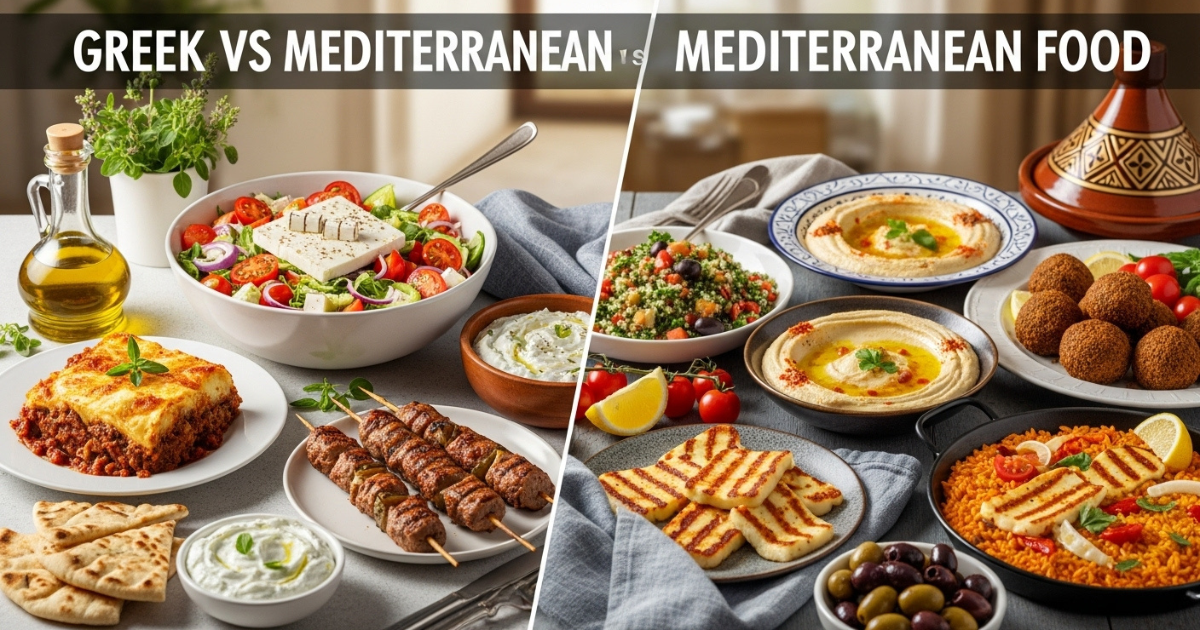Greek food is probably on the menu if you’ve ever dined at a Mediterranean restaurant. Additionally, if you’ve ever dined at a Greek restaurant, you’ve undoubtedly seen items using the word “Mediterranean” to describe their origins. Restaurants that specialize in either cuisine frequently use the terms interchangeably; however, there are a few distinctions.
Greek and Mediterranean food is distinguished by its historical origins, simplicity, and high-quality ingredients. It’s also important to note that despite the region’s diverse cultural heritage, historical ties have produced a wide range of similar culinary elements.
The fact that Greece is situated on the Mediterranean, Aegean, and Ionian seas is one of the things that some people find confusing. Despite being a Mediterranean nation due to its geography, Greek cuisine is distinctive. And some of the differences are as follows.
How Greek Food is Different from Mediterranean

Olive oil, vegetables, herbs, bread, grains, fish, and a variety of meats, such as lamb, chicken, and rabbit, are all staples of Greek cuisine. Greek cuisine is known for its distinctive meals like moussaka and souvlaki, as well as its assortment of dips like tzatziki.
Restaurants like La Shish include a variety of regionally specific Greek staples on their menus, such as:
Although these foods are most frequently linked to Greece, they can also be found on the menus of some Mediterranean restaurants under the heading “Mediterranean.” The name “Mediterranean” basically refers to all of the nations that border the Mediterranean Sea, which stretches from Slovenia in the north to Libya in the south, and from Spain in the west to Syria in the east. It is a huge body of water that touches the coasts of numerous nations.
How Mediterranean Food Differs From Greek Cuisine

You’ve probably heard of Italian, Lebanese, Spanish, Sicilian, Israeli, Moroccan, Egyptian, and, of course, Greek cuisines, which are among the most common Mediterranean cuisines. Mediterranean cuisine is a cosmopolitan blend of flavors, customs, and civilizations from Spain to Syria, creating a culinary paradise with something to offer everyone. Some of the most famous Mediterranean dishes that restaurants offer are:
The Mediterranean diet is popular and widely adopted in the United States and much of non-Mediterranean Europe because of the size of the sea and the distinct climate that produces some of the most unusual and delectable fruits, vegetables, and seafood in the world.
Common Ground: Similarities

Mediterranean cuisine includes Greek cuisine, and both cultures value a nutritious diet. A number of foods that are essential to the Mediterranean diet are shared by both. The foundation of each of these cuisines is made up of fresh vegetables like tomatoes and cucumbers, leafy greens, olive oil, cereals, and seafood. Greek and Mediterranean cooking methods place an emphasis on simplicity and let the inherent flavors of the products take center stage.
It’s intriguing to note how the culinary philosophies of Greek and Mediterranean cuisines are similar in that they emphasize the use of premium, fresh ingredients and straightforward cooking techniques that bring out the flavors of the food. This common perspective highlights a balanced diet full of plant-based foods, healthy fats, and lean proteins, and links us to a wider food culture.
Conclusion
In short, Greek food is Mediterranean food, but not all Mediterranean food is the same as Greek food. While Greek cuisine is an essential part of the Mediterranean diet, the two are not identical. Greek food carries its own unique flavors, iconic dishes, and cultural history, while Mediterranean cuisine as a whole represents a much broader blend of countries and traditions.
Both, however, celebrate fresh ingredients, olive oil, wholesome grains, and a balance of flavors that highlight health and simplicity. Whether you’re enjoying a plate of gyros in Athens or hummus in Morocco, both Greek and Mediterranean foods offer a delicious journey through centuries of culinary tradition.
FAQs
1. Is Greek part of the Mediterranean?
With hundreds of islands and nine distinct geographical areas, Greece claims the longest coastline in the Mediterranean basin. There are more than 10 million people living there.
2. Is Greek food unhealthy?
Because it mostly consists of fruit, vegetables, wholegrains, seafood, and a modest amount of cheese and yoghurt, the Greek diet is considered to be among the healthiest in the world.
3. What is the most authentic Greek food?
Briam (Mixed roasted vegetables),Keftedes, Soutzoukakia (Izmir kofte), Stifado, Souvlaki, Tzatziki, and Taramosalata (Greek fish roe dip) are some examples of the most authentic Greek food.
Related Blogs:



